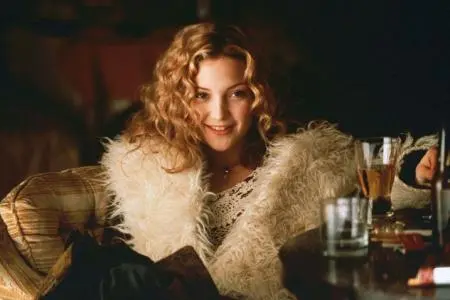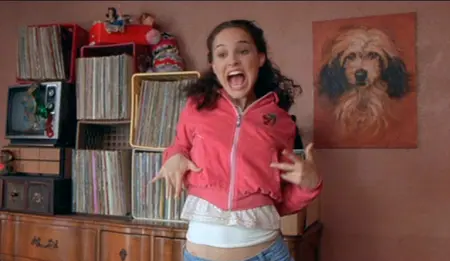Oh, the Manic Pixie Dream Girl. Hollywood's go-to female character. Some would argue it's time for the phrase to go away (and in fact, the man who coined the term has argued exactly that). That it's a tired old trope of tired modern films, and we'd do well to move as far away from it as possible.
Me? I think that to understand a trope like the MPDG we must better understand from whence it came. The why behind its existence. And also, to understand a character type is to find ways to subvert it, which, in turn, can make a girl a better writer. Deeply sketched out characters beat out generic Polaroids any and every day.
That said, in thinking about the "from whence it came" part the other day, I realized: this trope has existed for far longer than most people acknowledge. In fact, I believe it started in the opening decade of the Nineteenth Century, with none other than Jane Austen and her most famous heroine: the beautiful and feisty Elizabeth Bennet.
No? You don't believe such a thing could have existed in Jane Austen's time? Well, journey with me for a few, and we'll see what we can figure out.
What's a Manic Pixie Dream Girl anyway?
Way back in 2005, with the release of Elizabethtown, film critic Nathan Raban coined a phrase that gave name (and possibly power) to a common literary and movie character. Speaking of Kirsten Dunst's character in the movie, he wrote of the Manic Pixie Dream Girl:
...that bubbly, shallow cinematic creature that exists solely in the fevered imaginations of sensitive writer-directors to teach broodingly soulful young men to embrace life and its infinite mysteries and adventures.
Whether it was the palpable snark or the obvious accuracy of numerous issues with female-characters-written-by-men, the phrase caught on and skyrocketed to fame. Roger Ebert later took up its banner, describing the MPDG as a "movie creature" who is "completely available" and yet "absolutely desirable."
The trope was further broken down into a few guidelines, if you can believe that. Were they created so future brooding writer-directors would be aware when they created one? Or did the critics want us to learn to drop MPDGs on their heads? Regardless, the guidelines are thus:
- A MGDG does not pursue her own happiness
- A MPDG will never grow up
- A MPDG has no discernable inner life
- A MPDG is there to provide life lessons
Some Famous MPDGs
Surely you've seen enough movies with MPDGs to recognize the trope. In case you haven't, though, here are some of the most famous ones:
- Katharine Hepburn as Susan Vance in Bringing Up Baby (1938)
- Marilyn Monroe as Sugar "Kane" Kowalczyk in Some Like It Hot (1959)
- Audrey Hepburn (those Hepburn girls!) as Holly Golightly in Breakfast at Tiffany's (1961)
- Paige O'Hara as Belle in Disney's Beauty and the Beast (1991)
- Kate Hudson as Penny Lane in Almost Famous (2000)
- Natalie Portman as Sam in Garden State (2004)
Elizabeth Bennet, Manic Pixie Dream Girl?
So, can we add Elizabeth Bennett from Pride and Prejudice to the above list? Is she, even, perhaps, among the earliest examples of the Manic Pixie Dream Girl, unlabeled though she may have been?
Let's investigate.
First of all, it must be acknowledged, that calling a female character a Manic Pixie Dream Girl is, in many instances, a barely-veiled accusation of sexism. An MPDG is just a trope. As a character, she is little more than an over-used male fantasy. A tired wet dream.
She is also exclusively written by men.
Thus, at the heart of the accusation inherent in the MPDG label, Elizabeth Bennet, as a main female protagonist and point of view character, and as a woman created by a woman, cannot be an MPDG. But, if we look at all the other characteristics, and ignore the accusations and simply dissect the trope, maybe, perhaps, she is.

A MPDG Does Not Pursue Her Own Happiness
When we meet Elizabeth Bennet at the start of Pride and Prejudice, her own happiness scores last on her daily To Do list. She puts the needs of others first. She keeps up with her father's constant need for clever banter. She listens to her sister, Jane's, lovelorn musings about the debonair Mr. Bingley. She'd like to keep her sister, Lydia, from turning into a total hussy, and she needs to keep her mother from having a penultimate nervous breakdown.
Nowhere during the first third of the story, in fact, do we see Elizabeth Bennet waste a single thought on her own happiness. Even when she meets the dreamboat, Mr. Wickham, her fascination with him is only a passing thing. He's pretty to look at, and tells a compelling tale, but she cools quickly and, again, turns the focus to her lovesick sisters.
In fact, her own happiness doesn't come into play until the final bits of the story. Her youngest sister Lydia's disgrace seems to have placed an insurmountable wedge between Elizabeth and her Mr. Darcy, and for the first time she realizes: she deserves happiness, too.
But do those final pages at the end of the story, when she pursues and eventually finds her own match made in heaven, negate the fact that she is, in fact, an MPDG, out to save everyone else at the expense of herself?
Does the fact that Penny Lane, at the end of Almost Famous, pursues her own happiness when she books a ticket to Morocco, negate the fact that she's a classic example of the MPDG? Does Holly Golightly's decision (in the movie, not the book, don't even get me started on how much the movie got wrong) to go with Paul Varjak in Breakfast At Tiffany's negate her reputation of manic pixiness?
I don't think so. Not for them, and not for my sweet Eliza Bennet.
A MPDG Will Never Grow Up
It's worth noting that at the start of Pride and Prejudice, Elizabeth Bennet is "not one and twenty." Meaning: she's twenty. And while that wasn't yet old enough to call her a spinster, she was certainly of a marrying age, and then some. In fact, the much-younger Lydia (15 at the start of the story) gets in her digs throughout the novel, often teasing elder sisters Lizzy and Jane about remaining unmarried at the ripe old ages of 20 and 23.
Thus, it could be argued that Elizabeth, at the start of the tale, is refusing to grow up. At least a little. She's feisty and somewhat impulsive. When she hears Jane has taken ill at the Netherfield home, three miles away, she refuses patience, refuses help, and marches through the muddy morning to nurse her sister back to health.
An endearing gesture of devotion, sure, but one that also displays a slight lack of maturity, one which is pounced upon by Mr. Bingley's prim and proper sisters.
Lizzy loves to walk through gardens. She loves to read. She loves to play cards. All of these are the activities of the younger crowd of late Eighteenth Century England. And like Sam in Garden State she still lives at home, in the house of her childhood, and also like Sam, sweet Eliza has a childlike quality that's easy to adore.

A MPDG Has No Discernable Inner Life
Okay, okay, okay. Here's where my thesis crumbles a bit. Or rather, falls apart completely. But! Hear me out, okay?
Elizabeth Bennet, as the sole point of view character in this third person narrative, is full of life, both inner and outer. It's what, in my mind, makes Pride and Prejudice so remarkable. Through Elizabeth's thoughts and opinions on life and love and marriage and happiness, we get a glimpse into Jane Austen's head. Lizzy is, it's commonly thought, Austen's alter-ego. Her inner workings have been on display for generations of readers.
So does that mean, as a point of view woman, full of life and thought and beliefs, Elizabeth Bennet is, by definition, the opposite of an MPDG? Or is she instead a perfect example of how to completely subvert a common character trope? To turn it on its head? To make it into something better?
A MPDG Is There To Provide Life Lessons
If you consider the entirety of Pride and Prejudice is, quite possibly, turning a mirror on the complex problems of a strictly, economically divided society, then the whole thing is a giant life lesson. Thus, Elizabeth Bennet, one hundred percent absolutely, exists to provide life lessons.
Whether it's to her father, to whom she teaches the necessity of parental guidance, or to her sister, Jane, whom she teaches to be more cautious in forming relationships with bitchy rich women, Lizzy is the wisest character in the tale. The one who knows better (most of the time).
And to her Mr. Darcy, that brooding, silent, prideful man, she provides the ultimate life lessons: love is love and it is wonderful, and life is not to be taken too seriously.
Sounds exactly like what Sam taught Largeman, or what Penny Lane taught Williama Miller, or even what Holly Golightly taught Paul Varjak.
Manic Pixie Dream girls teach men how to be silly. They teach men to laugh. They teach men to get out of their heads for a minute. To look around at the real world. They teach men to appreciate life.
If that's not what Eliza Bennet does (among many other things), then I've clearly lost my mind.
So Is Elizabeth Bennet a MPDG, and What Do We Do About It?
No. Elizabeth Bennet is not a Manic Pixie Dream Girl, no matter how much my brain wanted think she was when I originally envisioned this column.
By its very definition, as provided by Raban, an MPDG is a female character written (often poorly) by a man. Thus, Eliza Bennet cannot be an MPDG.
But! What I love about her, and this silly, pseudo-academic exercise through which I've just taken you, is that, with Elizabeth Bennet, Jane Austen has provided generations of readers and writers with an example of how to utterly subvert this common, ridiculous trope.
With Elizabeth Bennet, we see a woman who teaches people. Who's wise. Who's altruistic and good.
But we also see her inner thoughts and motivations, as well as her failings. Her own pride. Her own prejudices. She's a three dimensional character, not a simple sketch who exists solely to benefit a more important male character.
We as writers would be wise to take note of this. Character tropes exist for a reason: they're easy, and they're often reflections of the things we wish to see in the world.
But tropes exist to be subverted, and a good writer will never be content to rely on them. A trope is, at its best, a starting point. A diving board. To write strong, solid characters, one must be willing to dive off the edge, into the depths of the character's innermost workings.
Remember this, the next time you sit down to write. Don't write what you want to see; instead, write what could actually exist, and make it better. Your story will be the beneficiary...and so will you.

About the author
Leah Rhyne is a Jersey girl who's lived in the South so long she's lost her accent...but never her attitude. After spending most of her childhood watching movies like Star Wars, Aliens, and A Nightmare On Elm Street, and reading books like Stephen King's The Shining or It, Leah now writes horror and science-fiction. She lives with her husband, daughter, and a small menagerie of pets.








